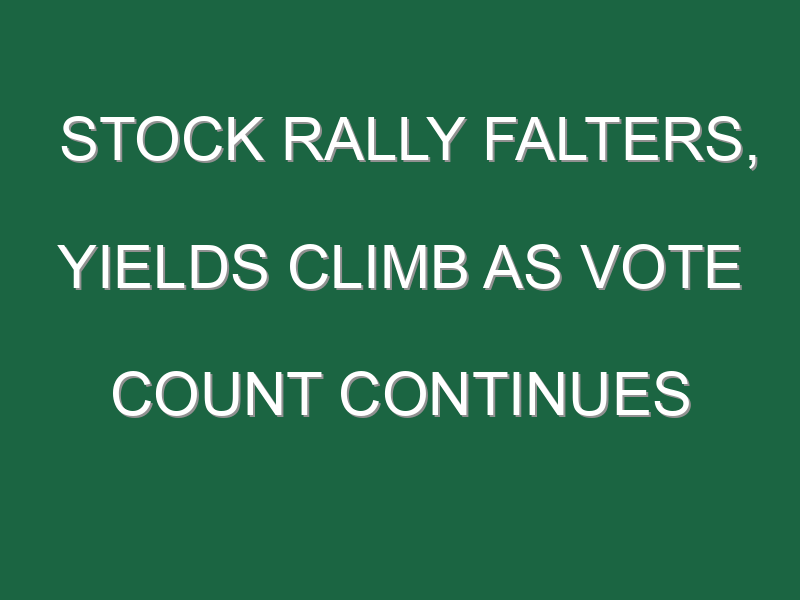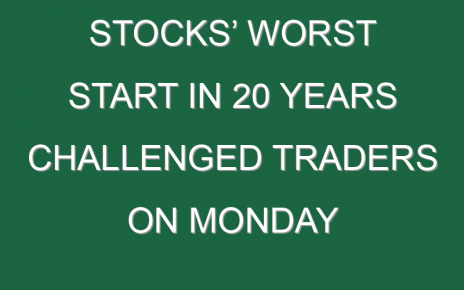Wall Street’s best week since April is taking its first breather on Friday, and stocks are slipping following their big rally on enthusiasm about the upside of potential gridlock in Washington.
Optimism was still pumping through other areas of the market, though, and Treasury yields climbed after a report showed U.S. employers hired more workers last month than economists expected. They’re the latest swings in a wild week dominated by Tuesday’s election, where the winner of the White House is still unknown.
The S&P 500 was down 0.4% in midday trading, though it remains 6.8% higher for the week. It had jumped at least 1.2% in each of the last four days, with the gains accelerating after early results indicated control of Congress may remain split between Democrats and Republicans. That raised investors’ expectations that business-friendly policies may stick around, regardless of who wins the presidency.
The Dow Jones Industrial Average was down 123 points, or 0.4%, at 28,266, as of 11 a.m. Eastern time, and the Nasdaq composite was 0.7% lower.
The yield on the 10-year Treasury climbed to 0.81% from 0.78% late Thursday after the U.S. government said employers added 638,000 jobs last month. The stronger-than-expected tally suggests the economic recovery may still be intact, though it also marked another slowdown in monthly job growth.
The rally helped the 10-year Treasury yield claw back some of its recent slide. It had been above 0.90% earlier this week when expectations were rising that a Democratic sweep of Tuesday’s elections could open the door for a big stimulus effort for the economy.
Electoral results so far, though, have sharply cut the prospects for such a “blue wave.” Democrat Joe Biden looks to be closing in on the presidency, with votes still being counted in several key states, but Republicans held onto several seats in the Senate that were considered vulnerable.
The upside of gridlock for markets is that it may prevent Democrats from approving some of the measures investors feared, such as higher tax rates and tougher antitrust policies for big technology companies. But the downside is that a still-divided Washington makes any support package for the economy coming from Congress likely to be less generous than if Democrats had swept the election.
Investors and economists say the economy needs such stimulus, particularly when the country’s new coronavirus cases are setting records once again. Europe is also facing a troubling rise in infections, and governments there have already brought back restrictions on businesses in hopes of slowing the spread.
Even if the strictest lockdowns don’t return in the United States, the worry is that the worsening pandemic will scare consumers by itself and erase profits for businesses.
The Federal Reserve still has the accelerator floored on its support for the economy, “so the wildcard for the recovery is whether Congress and whichever future Administration is willing to step up with sensibly crafted, and well-targeted, fiscal policy to support the recovery until the pandemic is under greater control,” said Rick Rieder, chief investment officer of global fixed income at BlackRock.
Another risk for the market is that of a drawn-out, disputed election for the presidency. Markets see cause for optimism if either Biden or President Donald Trump wins, and what investors want more than anything is for a clear winner to emerge.
Biden appears to be closing in on the needed electoral votes to win, but Trump took to the White House briefing room on Thursday evening to launch a litany of claims, without proof, about how Democrats were trying to unfairly deprive him of a second term.
His campaign has already filed legal challenges in several states. If the election drags on through court challenges, the resulting rise in uncertainty could send stocks spinning, analysts say.
“Financial markets probably will look past the lawsuits, if Biden can win without Pennsylvania or Georgia,” said Paul Christopher, head of global market strategy at Wells Fargo Investment Institute.
Control of the Senate by Republicans is also still not a certainty, even if indications lean that way. A surprise there could upset markets, which have rallied so strongly this week.
Among Wall Street’s biggest losers Friday was Live Nation Entertainment, whose shares slumped 4.6%. It reported a worse loss for the latest quarter than analysts expected as the pandemic throttles the concert and live-entertainment industries.
In European stock markets, France’s CAC 40 fell 0.3% and Germany’s DAX lost 0.5%. The FTSE 100 in London rose 0.3%.
In Asia, Japan’s Nikkei 225 rose 0.9%, South Korea’s Kospi added 0.1% and Hong Kong’s Hang Seng gained 0.1%. Stocks in Shanghai slipped 0.2%.
___
AP Business Writer Joe McDonald contributed.
More must-read finance coverage from Fortune:
- COVID-19 resurgence sets back Europe’s economic recovery hopes
- The U.S. economy is slowly beginning to climb out of its deep hole
- Stocks historically perform better under a divided Congress
- Theft of $2.3M from GOP shows how campaigns are juicy targets for hackers
- A journalist-turned-detective on how corporate America depends on private sleuths




